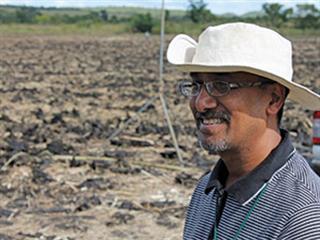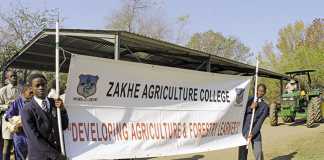
What does your department do?
My department’s main objectives are to initiate, facilitate and support the implementation of a sustainable land reform programme and rural development for the South African sugar industry. It seeks to be a facilitator of choice in achieving the sustainable transfer of land to beneficiaries by providing a comprehensive support programme, resulting in increased sugarcane production, skilled and capacitated sugarcane growers, and good governance and sound business management among the claimant land-holding institutions.
Give us a brief history of the SA sugar industry’s land reform initiatives.
The SA sugar industry has long recognised the need to promote diverse ownership of agricultural land under sugarcane, and the need for a range of support initiatives to promote the sustainable transfer of land. Our pro-active stance on land reform, which commenced in 1996, has been the foundation for our industry’s land reform achievements to date. The industry’s multi- pronged and -layered approach to land reform is one of the reasons our land transfer statistics are substantially higher than the national average. The sugar industry has transferred 21% of freehold land under sugarcane from white to black owners since 1994, off a base of 5%.
What are some of the industry’s recent land reform initiatives?
My department has initiated several projects that support the sustainable transfer of land to black growers. One such project is the development of a comprehensive support programme for land reform growers. Another is a partnership with government in which the sugar industry provides technical and facilitation support to ensure that production discipline is maintained during the land transfer process.
The third project is a strategic partnership to recapitalise transferred land reform sugarcane farms, where government provides the funding for agricultural inputs and infrastructure, while the industry supports growers in the development of farm business plans, training and production support. These projects will lead to optimal levels of production on farms and the emergence of skilled and capacitated growers, and sound governance practices among new land-holding institutions.
What are the sentiments of sugarcane landowners whose properties are under claim?
There are a fair number of willing sellers but it’s not just about the transfer of land because that is the easy part. It’s maintaining the sustainability of these transferred farms that is the main challenge. Further challenges include the fact that 39% or around 130 000ha of land under sugarcane is currently under gazetted land restitution claims. The sugarcane farmers who have land under these claims are uncertain about possible outcomes and therefore unwilling to make significant capital investments in their businesses.
In turn, this negatively impacts their sugarcane production and that affects milled sugar quantities and quality, and marketable SA sugar. Furthermore, the delays in the processing of these claims create tensions between affected landowners and the claimant communities. A number of restitution claims lodged in 1998 have still not been resolved and the claimants have become impatient and sometimes believe the delay is caused by landowners, and not the government. This issue is of particular concern.
How else is land reform affecting the sugar industry?
As a result of transformation processes in our industry, the sugarcane grower profile is changing. The 21% of land under sugarcane transferred to about 340 beneficiaries means the sugar industry has to respond very differently to the new grower profile. Many new growers who have benefited from land reform do not have any experience or qualifications in agricultural production. Other claimants wish to be landowners but not get involved in sugarcane production.
This situation poses challenges when it comes to providing new growers with the support they need to maintain sugarcane production for their benefit and that of the sugar industry value chain. The industry has responded by developing a comprehensive education and training pathway for growers.
Is the way that transferred land is held a concern?
The Department of Rural Development and Land Reform (DRDLR) has transferred a significant amount of land that is now held by each beneficiary community either in a trust or by a Community Property Association (CPA). Both options are communal holders of land mainly claimed through the restitution process. In most cases a community is made up of many members who have collectively claimed a portion of land. This mass ownership of a single piece of land creates its own challenges for the future sustainable use of the land.
We have found that little support is then given to the trust or CPA in terms of governance or business management. This leads to conflict between members as to how the land-holding entity, and the land, should be managed and used – particularly if the successfully claimed land was a fully functional farming business. The sugar industry has invested R12 million in a project to provide governance and business management support to 29 restitution projects across KwaZulu-Natal and Mpumalanga. Agri-SETA has also invested R3,4 million in the project.
How is the industry responding to concerns around land restitution?
In terms of land restitution, the first task we undertook was to gain a clearer understanding of the approximately 130 000 ha of sugarcane land under claim. It took us six months to gather a comprehensive database of every claim on sugarcane land, including every property falling within that claim, and then what the status was if the landowner was a willing seller.
This was done with the KZN Regional Land Claims Commission.
We now have a clear understanding of the extent and status of land restitution claims in our industry. Landowners of 7,5%, or about 29 000ha, of the 130 000ha of sugarcane land under claim have indicated that they are willing sellers. The South African Sugar Association (SASA) believes that this should be the immediate target which the Land Claims Commission commits to.
However, the sugar industry and the Land Claims Commission need an agreed-upon programmatic approach to effectively have this land transferred to claimants. Following a year’s work with the KwaZulu-Natal Land Claims Commission to develop this approach, we have agreed that starting in the current financial year, we will on an annual basis have a joint structured plan for the settlement of land claims with willing sellers, for that particular financial year. This is not just about the transfer of the land but will also align the industry’s and the Land Claims Commission’s support services to new landowners.
Are land beneficiaries consulted regarding post-settlement support?
We are developing models so that beneficiary communities can also be engaged on how they want to implement their farming projects in the future. For example, do they want a lease agreement or a joint venture with outside partners, or do they want to manage it themselves? We want to empower them to make informed decisions about the future of their successfully claimed land and the business on that land, because it is important that they are allowed that opportunity. This is where the industry currently is with regards to land restitution. Developing workable plans on how to deal with the various challenges creates certainty for the sugar industry.
How is the industry ensuring that sugarcane production is maintained post-settlement?
To deal with the concern regarding declining agricultural production post-settlement, in 2010 the DRDLR introduced the Recapitalisation and Development Programme (RDP). In the sugar industry, the milling companies and Mpumalanga section of SA Canegrowers have become strategic partners in the implementation of this programme. It’s a partnership between government that sets the policy framework, provides the funding and monitors the impact of these, the new sugarcane growers who commit to learning about and implementing the programme and the established sugar industry that provides technical support to implement the RDP in the sugar industry. All this with the aim of leading to increased production on transferred land.
Who are the role players in this?
SA Canegrowers provides the services of agricultural economists who have been developing the business plans with the inputs of the new sugarcane growers. The sugar milling companies have been the implementing agents and provided project managers, agricultural officers as well as business and social facilitation support to ensure that the programme is a success. The South African Sugarcane Research Institute provides sugarcane production extension services to the growers and SASA is responsible for the co-ordination of the RDP in the industry.
These support structures are not service providers paid by government to implement the RDP. One hundred percent of the RDP money that we access from government reaches the farm gate. The industry does not charge an additional fee for the services that it is providing to new growers. We can account 100% to government on how the funding is spent.
What has been achieved?
Over the last two years RDP funding, with implementation support from the industry, has resulted in the replanting and ratooning of 6 867ha of sugarcane land, the creation of 1 140 permanent and 3 517 seasonal jobs, trained 781 new growers and empowered 127 black contractors who supply services to new growers. They must be active participants in their enterprise development. Government and the sugar industry wants them to take ownership of, and responsibility for, their enterprises. The industry also has a Grower Development Account that has R2,7 million set aside for the provision of training to new growers in parallel to initiatives of the RDP.
Any advice to other agricultural sectors?
The key to the success of the RDP is the greater co-operation between government and the private agricultural sector, as can be seen between the sugar industry and government. There are certainly administrative challenges that inevitably arise between us and relevant government departments, and that can cause frustrations, but we have to work through these challenges to ensure that land reform is sustainable.
Contact Anwhar Madhanpall on 031 508 7384, or at [email protected] or visit www.sasa.org.za













